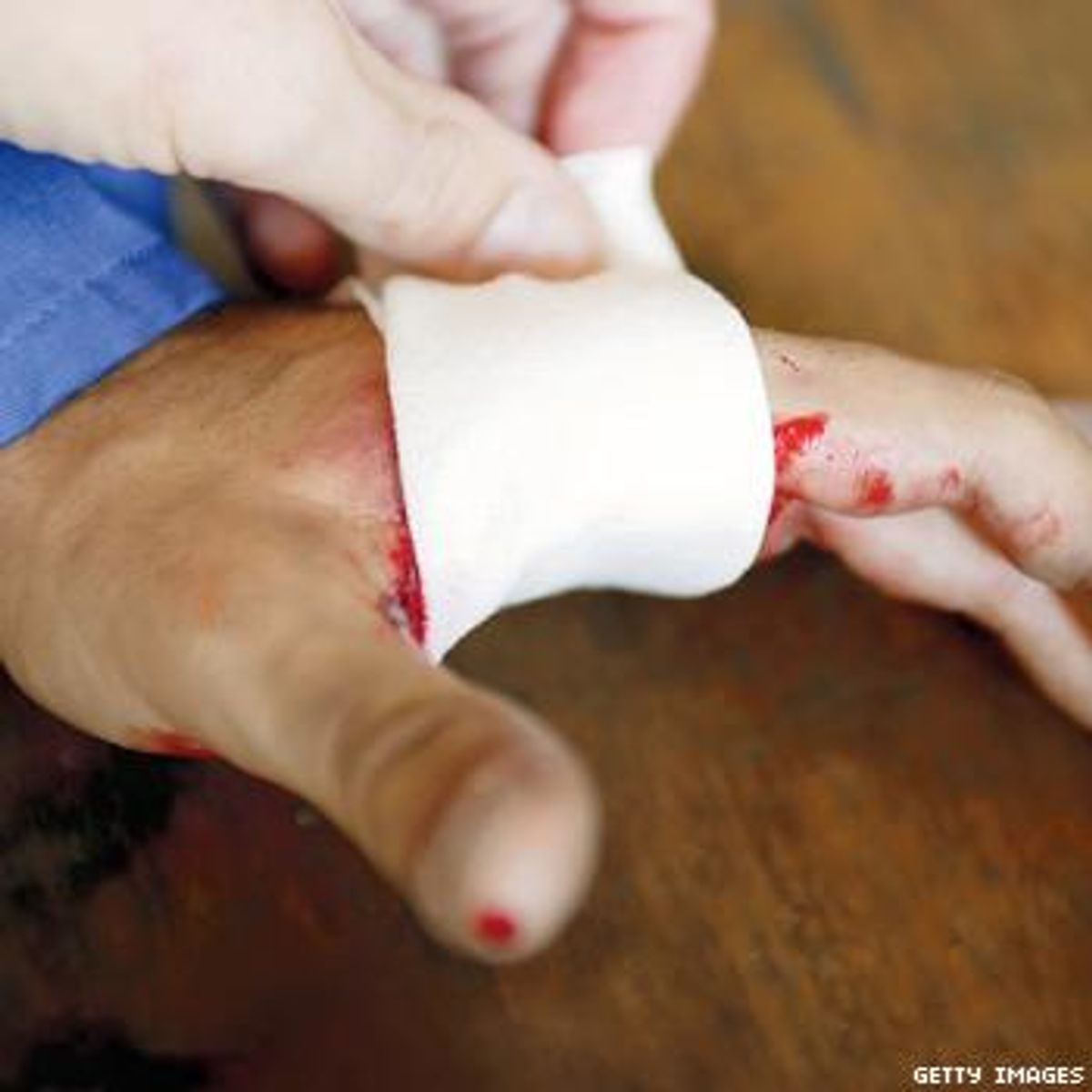Treatment GuideJust DiagnosedSex & DatingAfrican AmericanStigmaAsk the HIV DocPrEP En EspañolNewsVoicesPrint IssueVideoOut 100
CONTACTCAREER OPPORTUNITIESADVERTISE WITH USPRIVACY POLICYPRIVACY PREFERENCESTERMS OF USELEGAL NOTICE
© 2025 Pride Publishing Inc.
All Rights reserved
All Rights reserved
Scroll To Top
By continuing to use our site, you agree to our Private Policy and Terms of Use.
Allison jerks her hand out of the sink, wincing in pain. She's gotten a nasty cut from a kitchen knife, and the blood is already starting to drip from her sliced finger. As she grabs a towel to wrap around her hand, her daughter comes bounding into the kitchen.
'No!' shouts a frantic Allison, who is HIV-positive. 'Keep away!'
Although a bit dramatic, this scenario reflects one of the biggest fears of HIV-positive parents, according to a survey of families affected by HIV. It showed at least one family member in two thirds of families with an HIV-positive parent is worried about potentially spreading HIV in the home.
'The parents had two main concerns: one was contracting an infection from a sick child, but the biggest one was about transmitting the virus to their kids through blood from cuts and scrapes,' says lead study author Burt Cowgill of the University of California, Los Angeles/RAND Center for Adolescent Health Promotion.
While both of these fears are real and justified, additional worries reported by the study subjects were what Cowgill calls 'misconceptions.'
'Some of the parents would say things like 'Although I know it's not a mode of transmission, I still feel better if my kids don't eat or drink after me,' ' he says. 'These are people who know a lot about HIV transmission, but that parental urge to protect one's children sometimes overrode their knowledge.'
Even Tanya Torres, a longtime educator and an ambassador for the Elizabeth Glaser Pediatric AIDS Foundation, sometimes gets a twinge of discomfort when her HIV-negative 4-year-old son drinks from her glass or uses her eating utensils'despite knowing it's not a risk.
'I'm not real relaxed about it, but I'm not freaked either,' admits Torres, 25, who has always known life with HIV, since she was infected during a blood transfusion at birth. 'But I don't make it a big deal because I don't want him feeling like there's something wrong with him. And I don't worry too much about passing HIV on to him because I've done so much education to know what's risky and what's not.'
That education'for both parents and their kids'is the key to overcoming unfounded transmission fears in the home, according to Cowgill. 'We recommend that pediatricians tell kids not only how HIV is transmitted but more importantly how HIV is not transmitted,' he says. 'For example, sometimes the kids need to be directly told that it's OK to hug and kiss Mommy and Daddy. And the parents may need to be reminded of that too.'
For now, Torres has simply told her son that Mommy sometimes feels sick, and she's instructed him in general infection precautions, like never touching anyone's cuts, sores, or blood.
'I do plan to talk with him in more detail someday, but right now I don't want to give him more than he needs,' she explains. 'As parents, we do need to explain this to our kids, but we also need to tell them, 'Hug us, kiss us, love us. We can play on the playground with you. We can go see a movie with you and do everything else HIV-negative parents can do.' '
From our Sponsors
Most Popular
Lexi Love comes out as HIV+ after Trump deletes federal resources
January 23 2025 11:23 AM
Ricky Martin delivers showstopping performance for 2024 World AIDS Day
December 05 2024 12:08 PM
Trump's orders prompt CDC to erase HIV resources
January 31 2025 5:29 PM
California confirms first case of even more deadly mpox strain
November 18 2024 3:02 PM
This long-term HIV survivor says testosterone therapy helped save his life.
December 16 2024 8:00 PM
Plus: Featured Video
Latest Stories
HRC holds 'die-in' to protest Trump health care cuts
April 28 2025 2:11 PM
The Talk Season 5 premieres this spring with HIV guidance for the newly diagnosed
March 26 2025 1:00 PM
Jess King is here to help you live your happiest, healthiest life yet
March 24 2025 4:35 PM
Gerald Garth is keeping people of color happy and healthy through trying times
March 11 2025 3:38 PM
'RuPaul's Drag Race' star Trinity K Bonet quietly comes out trans
December 15 2024 6:27 PM
Hollywood must do better on HIV representation
December 01 2024 9:00 AM
Post-election blues? Some advice from mental health experts
November 08 2024 12:36 PM
Two right-wing Supreme Court justices signal they may uphold access to PrEP and more
April 21 2025 4:10 PM
500,000 Children at Risk: PEPFAR Funding Crisis
April 08 2025 3:51 PM
Discover the power of Wellness in your life
March 26 2025 12:41 PM
BREAKING NEWS: Trump admin moves to end federal HIV prevention programs
March 18 2025 6:10 PM
Celebrating Black History Month with our annual African American issue
February 01 2025 3:28 PM
Plus nominated for 2025 GLAAD Media Award
January 22 2025 12:42 PM
AIDS Memorial Quilt displayed at White House for the first time
December 02 2024 1:21 PM
Broadway's best raise over $1 million for LGBTQ+ and HIV causes
April 03 2025 7:15 PM
Season 4 of The Switch on resilience & radical self-love returns this spring
March 26 2025 12:20 PM
Tyler TerMeer vows to continue to fight for health care for all
January 28 2025 3:00 PM
A camp for HIV-positive kids is for sale. Here's why its founder is celebrating
January 02 2025 12:21 PM
Decades of progress, uniting to fight HIV/AIDS
December 01 2024 12:30 PM
Climate change is disrupting access to HIV treatment
November 25 2024 11:05 AM











































































